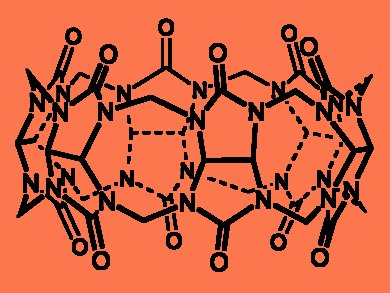Methods for increasing drug solubility are highly prized, as the solubility characteristics of 40–70 % of new drug candidates are so poor that they cannot be formulated on their own.
Volker Briken, Lyle Isaacs, and colleagues, University of Maryland, USA, describe a new class of general-purpose solubilizing agents which increase the solubility of ten insoluble drugs by a factor of between 23 and 2,750. Their acyclic cucurbit[n]uril molecular container complexes exhibit low in vitro toxicity in human liver, kidney and monocyte cell lines. They outbred Swiss Webster mice tolerate high doses of the container without sickness or weight loss.
The acyclic cucurbituril-type containers preferentially bind cationic and aromatic drugs. They also solubilize neutral drugs such as paclitaxel, a mitotic inhibitor used in cancer chemotherapy. Paclitaxel solubilized by the acyclic cucurbituril-type containers kills cervical and ovarian cancer cells more efficiently than paclitaxel alone.
The acyclic cucurbituril-type containers represent an attractive extension of cyclodextrin-based technology for drug solubilization and delivery.
- Acyclic cucurbit[n]uril molecular containers enhance the solubility and bioactivity of poorly soluble pharmaceuticals,
Da Ma, Gaya Hettiarachchi, Duc Nguyen, Ben Zhang, James B. Wittenberg, Peter Y. Zavalij, Volker Briken, Lyle Isaacs,
Nature Chem. 2012,
DOI:10.1038/nchem.1326




